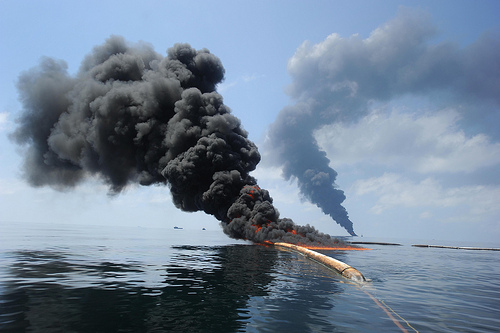 Will MMS really clean up its act? Or is it just smoke and mirrors?Once upon a time in the wonderful world of oil, the crude guys took care of the government guys. They gave them expensive presents. They partied with them. They were a team, a family. Not … any … more.
Will MMS really clean up its act? Or is it just smoke and mirrors?Once upon a time in the wonderful world of oil, the crude guys took care of the government guys. They gave them expensive presents. They partied with them. They were a team, a family. Not … any … more.
Culture shock: Michael Bromwich, head of the Bureau of Ocean Energy — the agency formerly known as the infamous Minerals Management Services — sent an email to his employees laying out new rules for doing business. No more winks and back-scratching, no more revolving door between the regulators and the regulated, and no more inspections on companies where family members or close personal friends work. Oh, and definitely no more sex and drug parties. That sounds righteous and all, but Bromwich’s policies have a long legacy to overcome. As Stephen Power, writing in the Wall Street Journal, notes:
Rig workers and agency employees in the Gulf Coast “have often known one another since childhood,” according to a report published earlier this year by the Interior Department’s inspector general. The same report found that at one agency office in Louisiana, employees accepted sporting-event tickets, lunches, and other gifts earlier this decade from oil and natural-gas companies.
Oh, so it was a teaching moment: BP says that it’s learned many lessons from its disastrous summer in the Gulf — now, there’s an understatement. A report BP is delivering to Department of Interior officials today says the company is now much better equipped to deal with deep water accidents. Call me crazy, but wouldn’t it make more sense to be equipped to deal with a deep water accident before the deep water accident. Another BP report expected soon makes the oil giant look even worse. According to a version leaked to Bloomberg’s Joe Carroll, BP’s internal investigation found that company engineers aboard the Deepwater Horizon rig misinterpreted test drilling results in the hours before the well exploded.
It’s nature way: Sen. Lisa Murkowski’s days as one of Big Oil’s best buddies in Alaska are over. The senator from Alaska conceded to her Republican primary opponent Joe Miller last night when it became clear that she wouldn’t get nearly enough absentee ballot votes to prevent an embarrassing upset. But the fossil fuel folks are shedding no tears. Miller, who’s well ahead of his Democratic opponent in the polls, insists that the science supporting climate change is in “serious question.” And if global warming is actually occurring, he sure isn’t about to blame humans. Proclaims Miller:
We know the temperature change is part of the process of our existence, but we haven’t heard there’s a man-made global warming.
Bake it to the limit: Not that Joe Miller’s worried, but it seems worth noting that it was 96 degrees F in New York City yesterday, making this officially the hottest summer in the city’s recorded history. From June to August, the temperature averaged 77.8 degrees F, breaking the previous high mark set in 1966.
Plastic not-so-fantastic: California’s reputation as an environmental trendsetter took a hit yesterday when state legislators rejected a proposed ban on plastic shopping bags. Enviros argued that state residents go through 19 billion plastic bags a year and a big load of them end up as litter. But the American Chemistry Council, which represents plastic bag manufacturers, spent millions to hammer home this year’s surefire anti-green message: This will cost jobs! The tactic worked again.
Go with the floes: They haven’t even discovered oil off the coast of Greenland yet — only natural gas deposits — but already Greenland has become an enviro battlefield. Yesterday, four members of Greenpeace stopped exploratory drilling by the Scottish company Cairn Energy by climbing on its rig and attaching a platform to it. Writing in The Guardian, John Sauven explains why drilling in the Arctic is different than anywhere else.
Anyone who has seen the remarkable images coming from the Arctic over the last few days will know how unusual, dangerous and extreme this business has become. While icebergs the size of football stadiums are towed out of a rig’s path, ships equipped with high-pressure water cannons blast smaller chunks into submission. And all the while the clock is ticking. As the winter freeze edges nearer, this frantic exploration company rushes to finish the job before sheet-ice cuts off the region completely.
Take the money and shun: Can banks have a conscience? According to a report by Tom Zeller, Jr. in the New York Times, at least some have become more wary about investing in nasty practices such as mountaintop removal mining. Their concern likely has more to do with avoiding unnecessary risks and legal entanglements. Or maybe they’re just trying to greenwash their reputations. Whatever. It’s a start. Writes Zeller:
… banking analysts and others suggest that heated debate over climate change, water quality, and other environmental considerations is forcing lenders to take a much harder — and often uncomfortable — look at where they extend credit, and to whom.
Some like it bot: In the oil spills of the future — and there will be some, let’s not kid ourselves — companies may not need to rely on a fleet of civilians using equipment that hasn’t been updated in decades. Instead, they can call out the robots. Researchers at MIT have developed a solar-powered robot prototype equipped with nanotechnology. They claim that a small army of the devices, dubbed “Seaswarm,” could clean up an area the size of the Gulf of Mexico in a month.
And no one has to worry about getting their life back.



